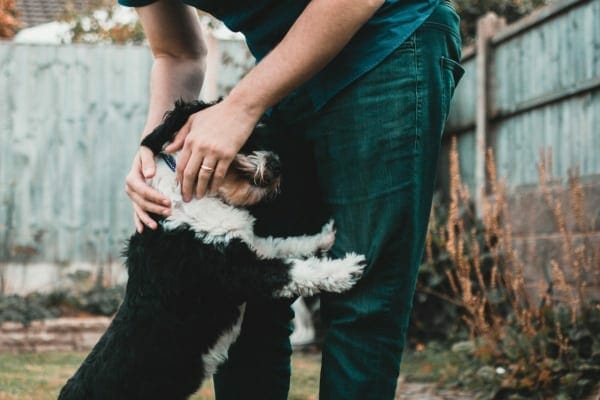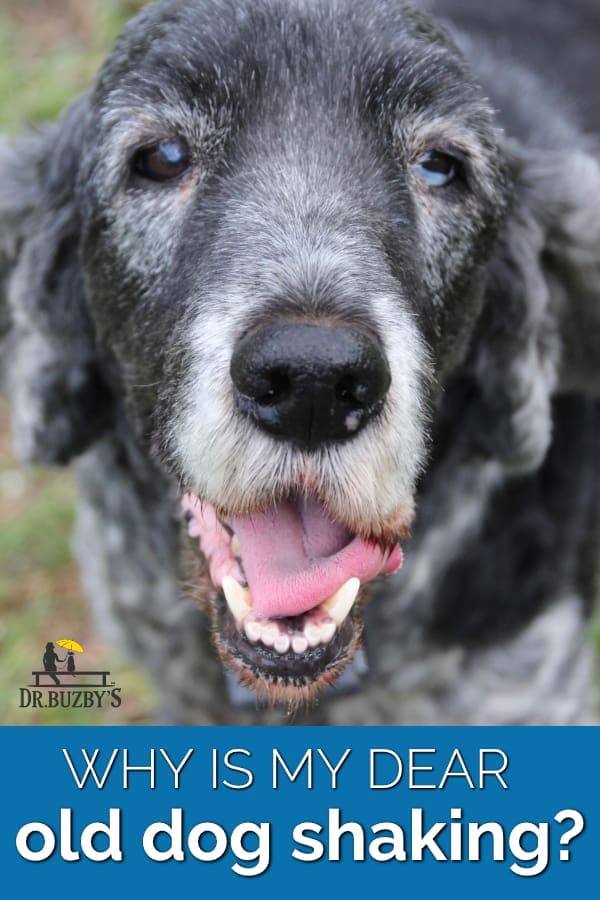13 Yr Old Westie Suddenly Walks Funny

SUMMARY: Your dear quondam domestic dog is shaking. Is this normal? Veterinarians Dr. Erica Irish and Dr. Julie Buzby take answers and actionable tips. Through a instance report of Dr. Irish's elderly dog, you'll acquire 11 common reasons why senior dogs shake, shiver, and tremble.
Why is my one-time dog shaking?
Lately, my 13-yr-onetime Dachshund, Bailey, has been jumping onto my lap and shaking more frequently than usual. Since developing arthritis a few years ago, he'd adopted this routine as his way of maxim, "Delight permit me go out to potty, or I'm going to burst!" Notwithstanding, now he was routinely hopping onto my lap and shaking, even if he'd but gone to the bathroom a few minutes prior.
I looked into my beloved companion'southward eyes and wondered, "What is he telling me? Why is my petty former domestic dog shaking?" As a veterinary, I knew that diagnosing the cause of shaking in an older dog can be tricky. I'd need to requite Bailey a thorough test and rule out many atmospheric condition so that I could help him. I'd start with the most common reasons senior dogs milkshake.

eleven reasons why old dogs shake
Shaking or trembling in senior dogs tin exist caused by a very long list of conditions, only a handful of diagnoses rise to the meridian of the list. Here are xi reasons for old domestic dog shaking (in no particular social club):
1. Excitement
Even an older dog can still go excited when his family comes home! Sometimes this excitement seems to exude right out of the dog's pores and shaking or trembling ensues. Forth the same lines, it is too possible for senior dogs to experience trembling and shivering when they are about to relish their favorite treat or play with their favorite toy.

ii. Medications/toxins
Several medications can cause tremoring as a side effect by altering the rest of neurotransmitters in the nervous system. Though the machinery for causing shaking is different, toxins can do the aforementioned. Mutual offenders include chocolate, xylitol, and pesticides.
PRO TIP: If you always suspect that your dog has gotten into a known toxin in your dwelling house, take hold of the box/container and take it with you to the vet to facilitate diagnosis and treatment.
3. Addison's disease
Even though Addison's is most commonly diagnosed in 4 to 5-twelvemonth-old dogs, dogs of any age can be afflicted. Addison's affliction makes our list because if left untreated, it is a life-threatening status.
Dogs with Addison'southward can announced very sluggish and experience airsickness, diarrhea, weight loss, loss of appetite, shaking, and hair loss. The symptoms are often vague, nonspecific, and come and go. Dogs with Addison's do not produce enough cortisol—a hormone made past the adrenal glands that helps dogs respond to stress and regulate blood sugar levels.
If your canis familiaris has clinical signs mentioned to a higher place, contact your veterinary. She will likely recommend blood and urine testing to screen for Addison'south affliction and other illnesses.
iv. Cold (hypothermia)
If your dog all of a sudden starts to shiver while out in the yard and the mercury has dropped, and so he may simply demand a sweater! Dogs can shiver and shake due to the cold just like humans. To forestall this, make certain your domestic dog has warm bedding and protective clothing during the cold months of the year.

5. Nausea
Nausea can exist acquired by numerous health conditions—infection, poisoning, liver illness, and kidney disease, to proper noun a few. A nauseous dog is not necessarily a vomiting dog. More subtle signs of nausea include:
- lip smacking
- shaking
- panting
- excessive swallowing
- drooling
If you're concerned near your dog showing signs of breadbasket upset, contact your veterinarian. Depending on the history and exam findings, your vet may recommend claret and urine testing to identify a cause. Routine lab work is especially important in senior dogs in order to detect disorders as early as possible, such as chronic kidney disease. (To learn more nearly collecting lab samples at habitation, please read seven Tips for Improving Your Dog's Lab Tests.)
6. Neurologic disease
Dogs with certain brain diseases tin can develop tremors and sometimes even seizures. Infection and/or inflammation of the primal nervous arrangement may be difficult to diagnose on routine testing. For this reason, your veterinary may recommend referral to a veterinarian neurologist for evaluation and more than specialized testing. Neurologic disease e'er has to be on the rule-out list when a senior dog suddenly starts trembling or shaking, merely information technology's important to remember that information technology is only one of many reasons for this symptom.
vii. Generalized tremor syndrome (GTS)
This tremor-causing status can occur in whatsoever size and color of dog, but it'due south likewise known as white dog shaker syndrome, because information technology is diagnosed well-nigh unremarkably in pocket-size, white breeds (especially the Maltese, the West Highland White Terrier, and the Bichon Frise). The tremors tin can be localized to the head or generalized—affecting the entire body. While the cause is unknown, there are some theories suggesting that the immune organisation plays a role. Steroid medications similar prednisone are prescribed for handling. While GTS mostly affects young dogs, because dogs have lifelong signs, older dogs can manifest symptoms too.

8. Hurting
If your older dog shivers or shakes, especially in the hind cease, he may be exhibiting one of the signs of pain due to canine arthritis. Dogs tin can also experience generalized pain due to infection, injury, and fifty-fifty dental disease. Depending on the source of pain, your veterinarian might recommend further diagnostic testing and/or prescribe hurting medication. If arthritis is suspected, our comprehensive guide, How to Salvage Arthritis Pain in Dogs, is a helpful resource.

9. Idiopathic
The term idiopathic comes from Greek roots and literally translates every bit "individual disease," simply we use it unremarkably in medicine to mean "of unknown cause." In that location are many idiopathic atmospheric condition in veterinary medicine, ranging from seizures to vestibular disease. The term can be associated with tremoring in older dogs too.
Unfortunately, idiopathic former dog tremor syndrome is—like all idiopathic mysteries—a diagnosis of exclusion. In other words, veterinarians dominion out everything else and so are left with idiopathic disease as the fall-dorsum caption.
If your senior dog exhibits shaking hind legs and the problem has not adult into progressive neurologic disease and your vet has ruled out other mutual diagnoses, and then you may be left with this diagnosis, which is dandy news. It is considered a beneficial condition.
10. Anxiety and fear
Like people, dogs can shake when they're agape or broken-hearted. Some dogs can be afraid of loud sounds similar thunderstorms or fireworks. For senior dogs, problems like vision loss due to cataracts and hearing loss tin alter their conviction and personality and make them more likely to tremble.

xi. Canine cognitive dysfunction
Some other cause of shaking in older dogs is canine cognitive dysfunction (CCD). Dogs with CCD can become more anxious and restless, especially at night. For more data near this common condition that afflicts senior dogs, check out Managing Canine Cognitive Dysfunction in Dogs: Signs, Symptoms, Solutions.
When to see the vet
You know your dog amend than anyone. If your grayness-muzzled companion is experiencing shaking and trembling, make an appointment with your veterinarian today. Early diagnosis almost always yields amend outcomes.
In add-on to performing a thorough physical exam, your vet will want to get together some key information to formulate a "rule out" list. By carefully observing your domestic dog'due south symptoms, you tin assistance your veterinarian narrow downwards the diagnosis. Be prepared to reply questions similar these:
ane. Is the shaking/trembling episodic—meaning does information technology come up and go? Or is information technology ongoing and continuous?
2. Does the shaking/trembling change with your dog's activity level? In other words, is it worse with activity and better at balance?
PRO TIP: We've all heard the joke almost your car suddenly non having the "symptom" y'all made the appointment for, as soon as you lot pull upward to the mechanic's garage to take it checked out. The same miracle occurs in veterinary medicine! Take a video of your former domestic dog shaking to show your veterinarian in case the patient looks different in the examination room than at home. We believe it will be exceedingly valuable for your vet to run across exactly what y'all see at home. Cheers to the modernistic cell telephone camera, this is easy homework.
What was the underlying crusade behind Bailey'due south shaking?
In the case of Bailey, I brought him to our hospital for testing to screen for some of the problems outlined above. Thankfully, all his results came back within normal limits! We determined that his "old domestic dog shaking" occurred generally at night due to anxiety and CCD. I've intentionally made some changes in our nighttime routine, and I started him on a prescription diet for older dogs, plus a supplement for calming. I'yard happy to written report that his shaking has greatly improved!

Does your love old dog milk shake or shiver?
Please comment below. We tin all learn from each other.
Source: https://toegrips.com/old-dog-shaking-shivering-why/
0 Response to "13 Yr Old Westie Suddenly Walks Funny"
Post a Comment